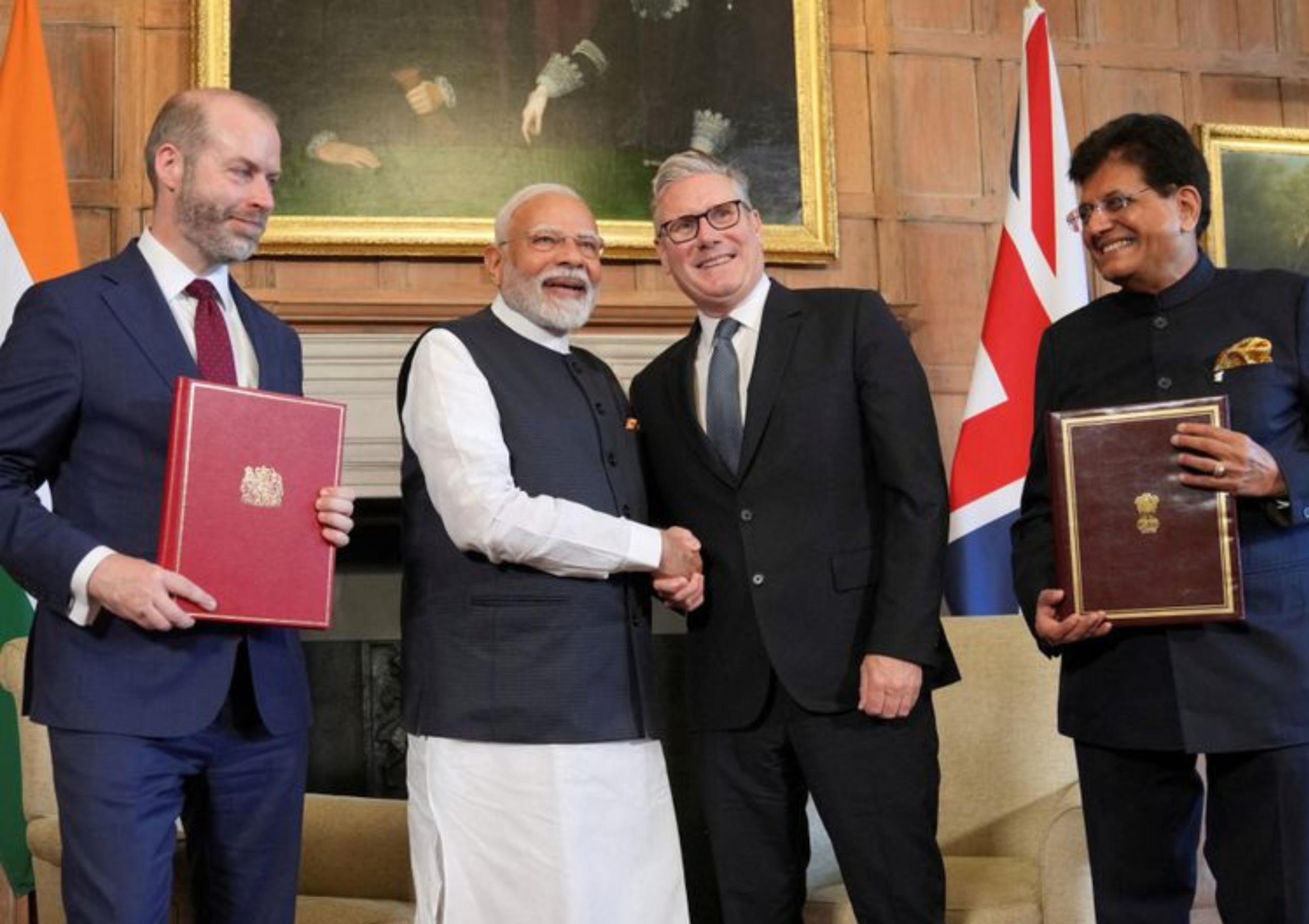
Dipanjan Mondal
In a significant step for India-UK relations, Prime Minister Narendra Modi and British Prime Minister Sir Keir Starmer today oversaw the signing of the Comprehensive Economic and Trade Agreement (CETA). This free trade deal aims to transform bilateral trade, improve market access, and create jobs in vital sectors.
The historic agreement was signed in London by India’s Commerce and Industry Minister Piyush Goyal and UK Secretary of State for Business and Trade Jonathan Reynolds, with both leaders present. India’s External Affairs Minister Dr. S. Jaishankar and UK Chancellor of the Exchequer Rachel Reeves also attended.
This agreement is seen as a major moment in India’s economic diplomacy, resulting from Prime Minister Modi’s strategic vision and outreach. For the UK, it marks Prime Minister Starmer’s first significant trade agreement since taking office, highlighting London’s renewed commitment to global partnerships.
Under the two Prime Ministers’ leadership, the CETA grants unprecedented duty-free access for 99% of Indian exports to the UK, covering nearly the entire range of trade. This change is expected to support India’s labour-intensive sectors, including textiles, leather, gems and jewellery, marine products, footwear, and toys. These industries provide jobs for millions and are essential to India’s export economy.
The presence of PM Modi and PM Starmer at the signing emphasized their political commitment to the agreement. For both countries, the deal is more than just about trade; it symbolizes a strategic partnership based on mutual economic growth and shared values.
Moments after the signing of the Comprehensive Economic and Trade Agreement (CETA) between India and the United Kingdom, Prime Minister Narendra Modi took to social media platform X to describe the moment as the beginning of a “new chapter” in bilateral economic ties.
“A new chapter begins today in the India–UK economic partnership! The signing of the Comprehensive Economic and Trade Agreement (CETA) reflects our shared commitment to enhancing trade, driving inclusive growth and creating opportunities for farmers, women, youth, MSMEs, and professionals,” PM Narendra Modi posted this on X after this historic signing.
PM Modi also praised his meeting with UK Prime Minister Sir Keir Starmer, calling the discussions “outstanding” and highlighting the broader impact of the agreement.
After this signing PM Modi said in post in social media platform X, “The talks with PM Keir Starmer were outstanding, particularly in the wake of the successful signing of the Comprehensive Economic and Trade Agreement. In addition to economic cooperation, this agreement sets the stage for boosting shared prosperity.”
He added that the two leaders had also unveiled a long-term strategic roadmap. “It’s equally gladdening that we’ve released Vision 2035 to deepen our Comprehensive Strategic Partnership. This will focus on sectors like defence, education, people-to-people ties, semiconductors and sustainable development.”
The agreement also significantly benefits the services sector. The UK is offering ambitious commitments in IT and IT-enabled services, financial and legal services, telecommunications, education, and engineering. Indian professionals, including architects, engineers, yoga instructors, chefs, and musicians, will gain from simplified visa rules and easier travel between the two nations.
After the signing, Piyush Goyal stated, “This CETA marks a milestone in trade relations between two major economies, establishing an ambitious and balanced framework. It opens up tariff-free access on 99% of Indian exports to the UK, covering almost 100% of trade value, including labour-intensive sectors that support the ‘Make in India’ initiative and aim to double bilateral trade by 2030. It features ambitious commitments in goods and services across various sectors while improving mobility for Indian professionals by easing access for contractual service providers, business visitors, and independent professionals. The innovative Double Contribution Convention will exempt Indian workers and their employers from UK social security contributions for three years, enhancing competitiveness and earnings. This agreement will act as a catalyst for inclusive growth, benefiting farmers, artisans, workers, MSMEs, startups, and innovators while protecting India’s interests and advancing our journey to becoming a global economic leader.”
The agreement also introduces the Double Contribution Convention (DCC), which will exempt Indian professionals and their employers from social security contributions in the UK for up to three years. This change will raise take-home pay and lower costs for Indian businesses operating in the UK.
Finalized after thorough negotiations, the agreement reflects the shared commitment of the two Prime Ministers to a modern and inclusive economic partnership. It is anticipated to drive bilateral trade, currently at USD 56 billion, toward the goal of doubling by 2030.
CETA is designed to be inclusive, offering new opportunities for women entrepreneurs, youth-led startups, farmers, and fishermen. It also encourages innovation, sustainable trade practices, and smoother integration into global value chains.
For both Prime Ministers, the signing of this agreement delivers a strong message: India and the UK are prepared to lead in shaping a new global economic order grounded in trust, openness, and shared prosperity.